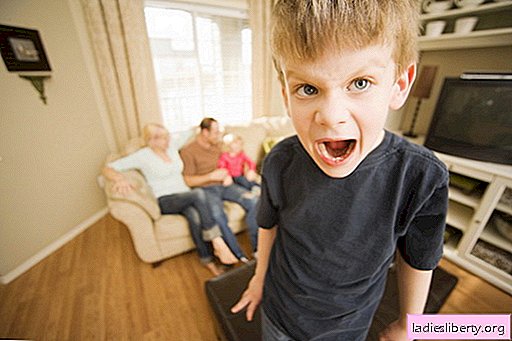
Whims, disobedience and childhood neurosis - what comes first and what is the consequence? Some moms consider the noisy tantrums of their children to be a manifestation of a disorder in his nervous system, but it happens the other way around - endless whims and inappropriate behavior lead to the emergence of childhood neuroses.
Nervous child - illness or disobedience
Nervousness of children is associated with deviations in their behavior - increased irritability, tearfulness, sleep disturbances, irritability and impressionability. A nervous child is difficult to communicate, spoils the mood of others, but first and foremost, the inadequacy of behavior changes his life, depriving him of simple childish joys. Years of research prove that the causes of childhood nervousness, in most cases, are laid in early childhood and are the result of improper upbringing.
Nervousness and disobedience of small children are so closely intertwined that it is sometimes hard to figure out who is to blame - the parents or their children. Among the many causes of disobedience can be identified main:
1. The child's desire to attract attention to himself - having noticed that much more parental emotions manifest themselves in the case of a misdemeanor, the child, suffering from a lack of affection, is unconsciously using a proven method.
2. A child restricted in independence and tired of numerous prohibitions defends his freedom and opinion through protest disobedience.
3. Children's revenge. The reasons for it can be many - the divorce of the father and mother, the failure to fulfill promises, unfair punishment, inappropriate behavior of one of the parents.
4. Own powerlessness of the child, the inability to perform any actions that are available for others.
5. Diseases of the nervous system of children, mental disorders.
Despite the fact that only in the last paragraph the problems with the nervous system are called the cause of disobedience, each of them convincingly testifies to the close connection of the child’s behavior with his psychological state.
Children's neurosis - causes and signs
The fragile and unformed nervous system of children is extremely susceptible to neuroses and mental disorders, therefore, the strange behavior of the baby, its whims and hysteria, should alert attentive parents and prompt them to take immediate action. Constant stress, restrictions, lack of attention gradually accumulate and develop into a painful state - a neurosis. Doctors call this term a disorder of a child’s psyche of a transient nature, caused by all sorts of stressful situations. Neurosis can be the cause of inappropriate behavior of the child, and may be the result of it.
Most often, neurosis develops around five to six years, although attentive mom notices some of its individual signs much earlier. Special attention should be paid to the behavior of the child during periods of age-related mental changes - from 2 to 4 years old, from 5 to 8 years old, and in adolescence. The causes of disorders of the nervous system of children can be considered the following:
- traumatic psyche of the situation - parents alcoholism, divorce, quarrels with peers, adaptation in the children's institution;
- severe fright as a result of any mental impact;
- excessive severity and rigidity of parents, lack of attention and lack of affection;
- The atmosphere in the family and the relationship between parents;
- the birth of a brother or sister, which switches the focus of the mother and dad, and bitter childhood jealousy.
In addition, there may be external causes - an accident, death or serious illness of loved ones, a catastrophe. The first signs that the nervous system of children is not functioning properly are:
- the emergence of fear and anxiety;
- problems with sleep - a nervous child has difficulty falling asleep and may wake up in the middle of the night;
- may cause enuresis and gastrointestinal disorders;
- speech disorders - stuttering;
- nervous cough;
- unwillingness and inability to communicate with peers.
If parents note aggressiveness, increased excitability or, on the contrary, excessive isolation, irritability, lack of sociability in the behavior of their little monster, then it is best to discuss the problems with the doctor. By letting the development of a possible disease go on drift and without taking any measures, parents risk raising a timid, indecisive person who is not able to cope with emerging problems and to contact others. It is necessary to consult a doctor even if the state of the nervous system of children disrupts the normal rhythm of life. The presence of stuttering, enuresis or nervous tic require immediate complex treatment from specialists.
Nervous tics in children - causes and symptoms
Doctors describe a nervous tic as a short-term inappropriate movement of a specific muscle group, which the kid simply cannot resist. According to statistics, every fifth child, at least once, experienced similar manifestations, and about 10% of children suffer from a chronic illness. This indicates that a huge number of children from 2 to 18 years old have complexes when interacting with their peers, they are shy of their obsessive movements, and the existing problem really prevents them from living a full life.
Nervous tics in children can be divided into several main groups:
- motor - biting of lips, grimaces, twitching with limbs or head, blinking, frowning;
- vocal - coughing, sniffing, hissing, snorting, grunting;
- ritual - scratching or pulling the ear, nose, hair strands, teeth clenching.
According to the degree of severity, the nervous tics in children are divided into local ones, when only one muscle group is involved, and multiple, manifesting simultaneously in several groups. If motor tics are combined with vocal ones, this indicates the presence of a generalized tic called Tourette's Syndrome, which is inherited.
It is important to distinguish between primary and secondary nervous tics in children whose clinical manifestations are similar. If the latter develop against the background of other diseases - encephalitis, brain tumors, traumatic brain injury, congenital diseases of the nervous system, then the primary causes are:
- improper diet - lack of magnesium and calcium;
- emotional shakes - quarrels with parents and their excessive severity, fear, lack of attention;
- stress on the central nervous system in the form of frequent and increased consumption of coffee, tea, energy drinks;
- overwork - prolonged sitting in front of the TV, computer, reading in dim light;
- heredity - the probability of genetic predisposition is 50%, but under favorable conditions, the risk of ticks is minimal.
In a dream, nervous tics in children do not appear, although their effect is observed in the fact that the child has difficulty falling asleep and his sleep is restless.
Is it possible to cure a nervous tic and when to see a doctor
In no case can not leave the nervous tiki in children without attention. A visit to a neurologist is necessary if:
- it was not possible to get rid of the unpleasant phenomenon within a month;
- tick causes inconvenience to the child and interferes with his communication with peers;
- there is a strong severity and multiplicity of nervous tics.
Important! The peculiarity of nervous tics in children is that they can be relatively quickly eliminated forever, but you can also remain with a problem for life. The main condition for successful treatment is finding out the reasons for the appearance of a tic and timely addressing a doctor.
After conducting certain studies and consulting with other specialists, the doctor prescribes the necessary treatment, which is carried out in the complex:
- medication;
- measures aimed at restoring the normal activity of the nervous system - individual psychotherapy and psychological correction during group classes;
- means of traditional medicine.
Parents are required to provide a calm atmosphere in the family, good nutrition and the correct daily regimen, an adequate stay of the baby in the fresh air, and sports. Reduce tic decoctions of soothing herbs - motherwort, valerian root, hawthorn, chamomile.
The course of the disease is significantly influenced by the age of the child. If the nervous tics in children have arisen at the age of 6-8 years, the treatment will most likely become successful, and you should not worry about the return of the disease. Age from 3 to 6 years is considered more dangerous, watching the baby, even in the case of the disappearance of unpleasant signs, will have to full maturity. But the emergence of nerve tics before the age of three is especially dangerous; they can be heralds of schizophrenia, brain tumors and other extremely dangerous diseases.
Education and treatment of the nervous child
Successfully overcoming failures in the nervous system of children depends on two main factors - comprehensive medical care and proper education of the nervous child. Do not think that the problems will pass with age, without qualified help from specialists, the treatment of a nervous child is impossible. If the doctor has diagnosed a neurotic disorder, both medical treatment and a psychologist will be required. There are special types of therapy that help get rid of the tightness of the baby, adjust the ways of communication, restore activity and interpersonal skills. Great help in this can provide parents.
Mom and dad should carefully analyze the causes of the child’s nervousness and try to eliminate them and create comfortable conditions for their children. In the absence of autonomy, which your son stubbornly seeks, you should give him more freedom, without focusing on controlling his actions. Catastrophically not enough time to communicate with the baby? Think about what is a life priority for you - career and impeccable cleanliness in the house or psychological health and wholehearted love and dedication of the little man.
To grow up healthy, mentally balanced children is not only the understandable desire of parents, but also their duty. Take care of the unformed and vulnerable psyche of the baby, so that later you don’t need to treat a nervous child with specialists. Moms and dads are quite capable of creating a stable and balanced microclimate in the family, avoiding unnecessary quarrels and unreasonable prohibitions, giving maximum attention and tenderness to their children, raising a self-confident little man. In no case should not scare the crumb, inadequately respond to his misdeeds, overly restrict freedom. Following these simple tips of experienced psychologists will serve as a reliable prevention of various neurological disorders in your children.











